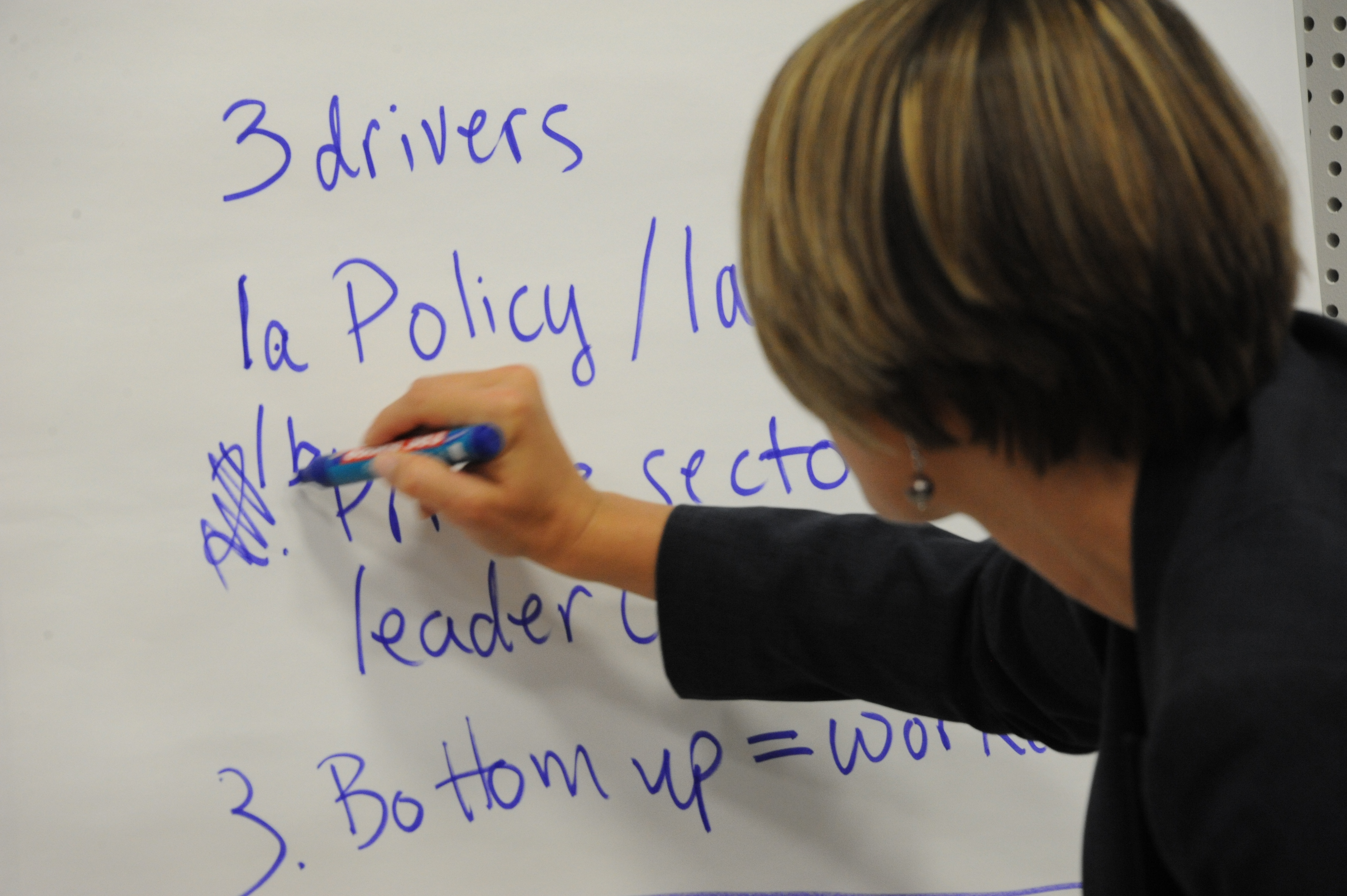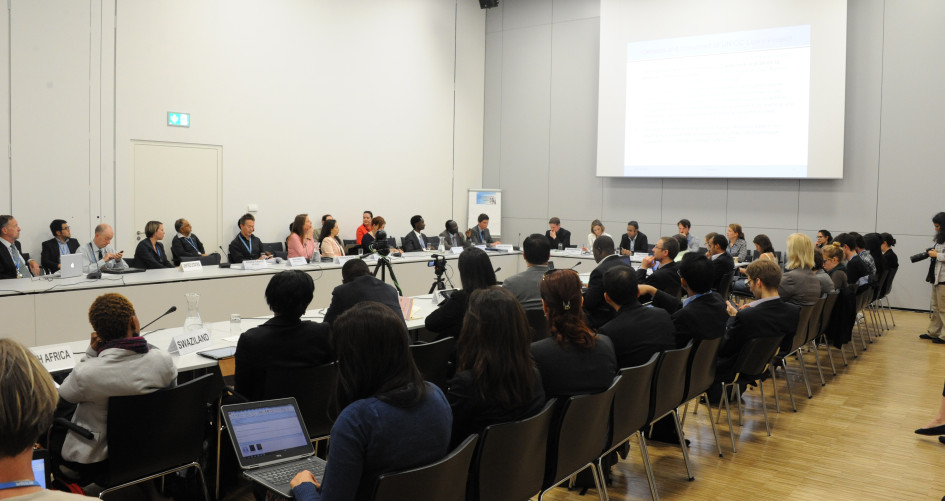An absolutely central foundation for raising global climate action is to ensure that everyone in the World knows both the dangers of climate change and the enormous opportunities that arise by adopting the solutions to it. In short, we need to understand the transformation that must be made, and equip ourselves with the necessary skills, in order to make it.
Climate change education in its broadest sense is the mission of Article 6 of the UN Framework Convention on Climate Change (UNFCCC) and this objective, including international cooperation on how to achieve it, was the focus on day one of the two-day annual Dialogue on Article 6, in Bonn, Germany, during the June negotiations session.
Christiana Figueres, Executive Secretary of the UNFCCC said that action starts with individual people and that the aim of the dialogues were to help seed the climate change issue into education and training programs around the globe to engage individuals and enable them to be part of the solution. She said:
It is not only about studying climate change, but also about understanding it. It is critical to include it in curricula, but it needs to be embedded in the DNA of today’s very education concept. It is not just another course; it is about how everything else we study or do is affected by climate change. It is about understanding the transformation to be able to act on it.
At the event, Amena Yauvoli, Chair of the Subsidiary Body for Implementation (SBI) and chair of the negotiation group on Article 6, welcomed the Parties to the UNFCCC, representatives of constituted bodies and programmes, experts, practitioners and stakeholders who had come to share their experiences and exchange ideas, best practices and lessons learned.
Why our Brains Are Wired to Ignore Climate Change - and How to Rewire them
George Marshall, founder of the Climate Outreach Information Network and author of “Don’t Even Think About It: Why our Brains Are Wired to Ignore Climate Change”, gave a keynote address which looked at how to promote challenging truths to unwilling audiences and apply them to climate change.
He said that communicating and educating about climate change needs to focus on peoples' emotional as well as intellectual nature because the academic messages from climate science were not getting through strongly enough. He explained that most humans, understandably, will tend ignore what creates anxiety and uncertainty but that they WILL act once they are moved by emotions that reach out to their core individual or group values.
Watch an interview with George Marshall:
After a discussion confirming that climate change education goes well beyond the boundaries of school, formal processes and young audiences, Nick Nuttall, UNFCCC communications chief, closed the session, encouraging participants to transform all the good will, motivation and ideas proposed during the dialogue into action to implement these ideas. He also underlined the opportunity that the UN Sustainable Development Goals offered in common educational themes with climate change. He said:
Defining climate change is about how to equip people for life in a changing world.
In a break-out session, participants examined five topics related to climate change education and came up with the following conclusions:
Policies, strategies and long term approaches for climate change education for sustainable development
It is imperative to focus on adequate communication and transparency when dealing with climate change education and that decision makers in charge of climate change, education and sustainable development work together to adopt an informed and coherent approach.
Fostering societal transformation and behavior change through non-formal and informal education
Outdoor education can help individuals to connect more with the natural world. They suggested that a platform be set up for people affected by climate change to tell their stories, and give a concrete and human side to the phenomenon and its science. Finally, they proposed that Article 6 national focal points and Youth NGOs cooperate more to engage young people. The group added that these recommendations should support outreach to citizens and whole communities and not only relate to a schooling system.
Using information and communication technologies for promoting climate change education
There is a gap between the availability of educational material and access to it which needs to be bridged by creating a centralized communication platform to promote climate change education, producing a generic curriculum to supplement national ones, and creating educational programmes for the media.
Paper materials should be kept for those who cannot easily access information and communication technologies, and information kiosks could be set-up in identified communities for both schools and individual citizens to visit.
Strengthening the implementation, monitoring and reporting of climate change education
The group recommended that standards be developed to monitor the implementation of programmes, and that common indicators be shared widely including a common terminology to name what is being reported on. They identified the need for students and citizens at large to be given the opportunity to interact with policy makers and actors on the ground, not only teachers. They finally proposed the monitoring of the impact of education, such as empowerment: what becomes of students after they get an adequate climate change education?
Scaling up climate change education through international cooperation.
The group proposed to expand the word “education” beyond school institutions and engage whole communities instead, both formally and informally. Engaging the educational community in this process more actively would also serve the purpose.
Day 2: Climate Change Training and International Cooperation on this matter

The second day of the Dialogue held on June 3 focused on training and international cooperation relating to training. The participants broke out into working groups and came up with the following points covering five themes:
Training and skills development for green jobs and low emission development
Strong policy signals are one of the main drivers of green jobs, and investment in this sector resulting in the creation of green jobs has been highest in countries that have set clear policy objectives. Sometimes there is a lack of understanding of the climate change benefits of green jobs. A recommendation was not only to match training or green jobs with income generating activities, but also to strengthen awareness the corresponding climate benefits.
Fostering climate resilient development through skills development and training on adaptation
There is no universal model for training in climate change adaptation. The challenge here is first to make people in their own communities understand how climate change affects them, and to tailor the training to their specific needs. A further challenge is to ensure that young people are included. One recommendation was to encourage the transfer of local knowledge, for example through youth exchanges. This would help maintain the balance between focusing on specific, local needs and what’s happening in the wider world.
Training and empowering strategic groups for mobilizing climate action
There is often a lack of incentive to learn about climate change and act upon it. This goes hand-in-hand with concern about the consequences of climate action, such as the perception that driving a car is a bad thing. In this context, there is a need to promote more positive messages about climate action, as well to generate the notion of a shared commitment to protecting our planet. The group recommended that efforts be made to build climate knowledge into the structural DNA of our societies.
Training of trainers and professional learning
Training of trainers is useful in bridging the gap of scalability. However, sometimes trainers have such a high level of expertise that they are unable to pass it on in an effective way. One recommendation is to ensure that the focus is not only on the topic, but also on the method of training, while also following up on results by creating feedback loops. The group noted the importance of providing the technical means for training, using the latest technology to make content available and keep trainers up to date on both the topic and latest methods.
Scaling-up climate change training through international cooperation
Scaling up climate change training doesn’t mean having one shared global view. More effective is to have a platform to share and communicate, as well as cooperate. In the global context, it is important to find out how people learn so as to adapt methodologies accordingly.
The Dialogue was facilitated by Katarzyna Snyder of the Ministry of the Environment of Poland, joined on day one by her special guest Kartikeya V Sarabhai, Director of the Centre for Environment Education, India. Over the two days, participants in the Dialogue presented several initiatives and programmes on climate change education and training undertaken around the world and shared their results, good practices and lessons learned. The presentations delivered at the Dialogue are available on the UNFCCC website.
In her concluding remarks, Ms. Snyder quoted the following African proverb:
If you want to go fast, go alone. If you want to go far, go together.
Picking up the theme of the keynote address by George Marshall at the opening of the dialogue, she underlined the need to start communicating differently on climate change, touching people’s hearts as well as minds.
The UNFCCC's Nick Nuttall thanked Mr. Marshall for his new perspective on behavioural change. Picking up on the previous day's invitation by Christiana Figueres to find a new name for Article 6, Mr. Nuttall asked participants to send in their suggestions by twitter using the hashtag #Article 6.
Amena Yauvoli, Chair of the SBI and of the negotiation group on Article 6, closed the session by stressing the vital role of education, training and international cooperation as we move towards a new, universal climate change agreement. The 4th Dialogue will take place during next year’s June sessions and will focus on public awareness, public access to information, public participation and international cooperation on these matters.
